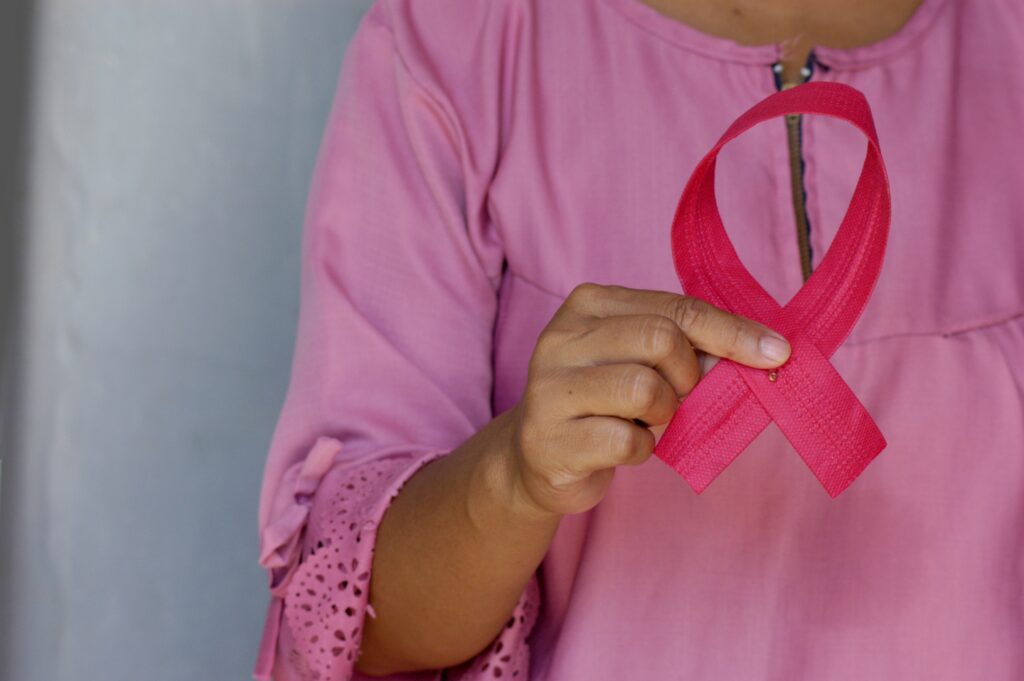Breast cancer is the most common malignancy in women across the globe. Breast cancer in young women is mostly hormone-receptor-negative, aggressive with fewer options for treatment, and has a poorer diagnosis than that of older women. When a woman is diagnosed with breast cancer no matter what the age or social status is it comes as a shock for the patient. Women perceive their breasts as something that completes them and gives them confidence in their femininity, and therefore they feel demoralized and hopeless after being diagnosed with this disease.
Breast cancer not only has an impact on a woman physically but it’s also deteriorating psychologically because when a woman is diagnosed with breast cancer, she feels like losing it all due to society’s demoralizing behavior. According to studies, depression is reported in women being diagnosed with breast cancer as they start feeling demotivated and find it difficult to cope with their life. Young women who are diagnosed with this disease are reported to have a high impact on their mental health as compared to older women because young women have physical, psychological, and social concerns that require special attention from a multidisciplinary healthcare professional.
Psychological impacts of breast cancer:
Following are the major psychological effects on the patient being diagnosed with breast cancer
Anxiety:
When it comes to the psychological impacts of breast cancer Anxiety is one of the main causes of distressing mental health ranging from 10 to 30% of patients diagnosed with breast cancer suffer from anxiety. Patients may experience anxiety due to fear of what might happen in the future and also if anything might go wrong and also due to the possibility of the reoccurrence of the disease even after the treatment These kinds of thoughts will lead to patients suffering from anxiety during or after the treatment. Recent studies show that anxiety is more prevalent than depression in breast cancer patients.
Destress:
Patients who suffer from breast cancer are also shown to have symptoms of distress with depression and anxiety and they find it difficult to stabilize their mental health. Additional stressors like side effects of treatment and how they can affect one’s future lead to a chain of stressful patterns. Patients’ distress levels may rise during different phases at the time of treatment. For example, some patients may experience clinical distress at the time of diagnosis, yet during the active phases of treatment, breast cancer patients report higher distress when compared to prostate cancer patients, showing concerns regarding being fatigued, their family and friends, being over or underweight, fears, worries, and pain.
Some breast cancer patients are affected after treatment because of the discontinuation of regular contact with medical specialists. Young patients are reported to show a high percentage of distress because of social pressure. Breast cancer treatments including radiotherapy, chemotherapy, and radiation can be a cause of distress because patients may suffer from unstable mental health due to ongoing treatment and the fear of the outcome of treatment.
Depression:
Depression is highly observed in patients who suffer from breast cancer as compared to patients who suffer from other types of cancer. According to the study, the depression rate is from 10 to 30% in patients who suffer from breast cancer based on population, study design, and choice of measure of depression. It harms women’s quality of life, immunity, survival skills, and also on their self-confidence. Diagnosis of depression can be very challenging because symptoms of depression can overlap with physical signs of illness.
Physical impacts of breast cancer:
Breast cancer diagnosis not only disturbs women’s mental health but hurts their physical health as well. These physical changes can cause women to have low self-esteem and make it difficult for them to accept their own bodies. The following are the major physical impacts caused by breast cancer diagnosis:
Body Image:
Body image (BI) is analyzed as a multifaceted construct, defined as “the mental representation of one’s body, thoughts, and feelings about their physical appearance, social activities, and how competent they are, as well as the overall condition of wellness, function, and sexuality”. Negative perceptions about one’s body not only cause mental distress but low self-confidence as well.
Treatment procedures such as chemotherapy, surgery, and adjuvant therapy cause body image issues like hair loss, weight gain, partial or complete removal of one or both breasts, incorrect positioning of breasts and asymmetry of the breast, severe scarring, and breast alteration. Disturbance in body image can cause women to feel uncomfortable about their appearance due to societal pressure and it can lead to cause distress in coping with day-to-day tasks. It’s very important to understand psychological distress related to body image disturbance and the impact it has on women’s physical and mental health.
Sexual Dysfunctionality:
Recent studies have shown that breast cancer highly affects women’s sexuality. Since women’s Breasts are a sign of women’s sexuality and femininity breast cancer is a threat for women. Women who had mastectomies mainly developed depression, body image disorder, and sexual dysfunction and it negatively impacted their perception about their own self. Both cancer and its treatment affect women physically by affecting their sexuality. Depression, pain, vaginal dryness, and sleep disturbance are factors that contribute to the onset of sexual dysfunction.
In younger women, sexual dysfunction is related to chemotherapy and premature menopause. Side effects from treatment along with premature menopause are loss of sexuality and vaginal dryness being a major problem for women. The major sexual dysfunctions faced by women after being diagnosed with breast cancer include: dyspareunia, vaginal dryness, decreased pleasure, fear of loss of fertility, negative body image, loss of femininity, loss of attractiveness, decreased sexual arousal, fatigue, decreased desire and sexual interest, lack of empathy in the intimacy of the couple’s relationship, anxiety, depression, etc.
Hair Loss and Fertility:
Treatments like chemotherapy may result in hair loss and it can range from treatment to cause the thinning of the hairline as well as loss their hair altogether. It’s not easy for women to cope with losing their hair since long healthy hair symbolizes beauty and most patients feel ashamed about how they look but it can be coped with wearing a wig until the hair doesn’t grow back. Breast cancer treatment in younger women may cause early menopause and it can also affect their fertility because there will be fewer chances for them to conceive in the future in this case help from a medical health specialist may help.
Conclusion:
Elderly and young breast cancer patients might have similar psychological problems related to the trauma of diagnosis, side effects of therapies with the consistent change of body image and sexual behavior, fear of recurrence, and end of life. Many psychotherapeutic and supportive approaches might be effective for patients of different age groups. To have a successful psychological approach in elderly patients, the most effective interventions are psychotherapy, Meditative reconciliation interventions, and soft cognitive rehabilitation interventions.


1 thought on “Breast Cancer Diagnosis: The Psychological and Physical Realities”
Pingback: Breast Cancer Awareness: Why It's More Than Just Pink